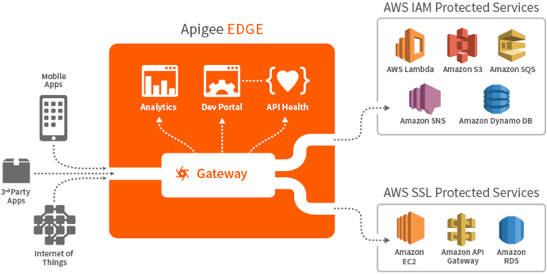|
Voiced by Amazon Polly |
Google has been on an aggressive buying spree on cloud. But they are acquiring only a specific kind of companies: the companies that support a mission critical AWS workload. Google has bought many companies in cloud, that were either only supporting AWS, or primarily supporting AWS workloads. Below are some examples of such acquisitions.
Orbitera (Aug 2016): The Orbitera Cloud Commerce Platform enables multi-cloud software delivery. It also makes it easier for enterprise and SMB customers to buy, deploy and manage software on multiple cloud platforms. Although, Orbitera supports multiple cloud platforms, the primary users of Orbitera are many of the large AWS consulting partners. There is a use case on Orbitera on how a Premium AWS Consulting Partner is using them for their billing to their clients. Thus, Orbitera supports some of the critical workloads of AWS partners.
Apigee (Sept 2016): Apigee helps companies quickly develop robust APIs for their services, that use on-premises resources or cloud services in the backend. A lot of companies use Apigee to create vendor neutral APIs that could potentially work on AWS as well as other cloud platforms. A majority of Apigee customers use AWS in the backend. Apigee also has a reference architecture for AWS on their site. Thus, Apigee solves a critical workload for corporations that of the exposing robust APIs on AWS.
Qwiklabs (Nov 2016). This is the most interesting acquisition by Google. Qwiklabs are the No.1 training partners for AWS. So much so, AWS official trainings use them. AWS also gives free access to many of the labs in Qwiklabs to it’s customers. It’s fair to say, official AWS training is currently completely dependent of them. Also, Qwiklabs only did AWS labs until now and they have not added any other cloud platform labs. Thus, Qwiklabs supports a very critical workload of educating employees of a corporation.
These examples prove that there is a deliberate strategy of Google to acquire companies that support mission critical workloads on AWS. Further down the road, Google might strategize to do one of the following with the acquisitions:
- The acquired companies might stop supporting AWS altogether. The revenue from these companies is like a rounding error on Google’s balance sheet. Google might just take the small revenue hit and stop the acquired companies from supporting AWS. This might force customers using these acquired companies to move to other competing services, or change to using Google Cloud Platform.
- The acquired companies might keep supporting AWS, but stop releasing new AWS related features. AWS keeps adding services at a phenomenal pace. The acquired companies might stop integrating new AWS features and services and might keep adding more features for Google Cloud Platform, to make it more attractive for the users of acquired companies to move to Google Cloud Platform.
- The acquired companies might make it easy for corporates to have a DR or secondary installation on Google Cloud Platform. Google might ask the acquired companies to keep supporting AWS, but make it super easy to generate a DR installation on Google Cloud Platform. As corporations, might already be looking for a DR strategy and possibly a solution to break their 100% dependency on AWS, they might find this option the best. They might possibly even migrate some of the workloads to Google Cloud Platform, to gain experience and be ready for migration to it, if needed.
In your opinion, which of the three strategies will Google choose? Maybe there is another angle to all this that I might have missed. Will the strategy of acquiring mission critical workloads of AWS work for Google Cloud Platform? Please let me know your thoughts.
Also, what does this mean for the future of Cloud Enterprise Architects and Cloud Solutions Architects? In such a scenario, it becomes even more important for Cloud Architects to be able to build a solution on multiple clouds. But the ground reality is that most Cloud Architects currently have knowledge of and work on a single cloud platform (mostly AWS or Azure). It will become even more important for Cloud Architects to have mastery on multiple cloud platforms. A Cloud Architect needs to be a vendor neutral, unbiased assessor of capabilities, only working in the best interest of their company (or client). I think the future belongs to professionals with mastery on providing solutions that work on multiple clouds. Would you agree?
Feel free so share your thoughts below. Thanks.
Get your new hires billable within 1-60 days. Experience our Capability Development Framework today.
- Cloud Training
- Customized Training
- Experiential Learning

WRITTEN BY Bhavesh Goswami
Bhavesh Goswami is the Founder & CEO of CloudThat Technologies. He is a leading expert in the Cloud Computing space with over a decade of experience. He was in the initial development team of Amazon Simple Storage Service (S3) at Amazon Web Services (AWS) in Seattle. and has been working in the Cloud Computing and Big Data fields for over 12 years now. He is a public speaker and has been the Keynote Speaker at the ‘International Conference on Computer Communication and Informatics’. He also has authored numerous research papers and patents in various fields.


 Login
Login


 February 23, 2017
February 23, 2017
 PREV
PREV








A. Manello
Jul 30, 2017
I’m really interested in GCP because of the TensorFlow chip that Google designed, but they don’t publish any material to study. They’re not as good Microsoft when it comes to marketing.
Monika
Jul 16, 2017
This is interesting, however, CSPs eventually will have to work basis blue ocean strategy, and not kill each other. The kind of security features AWS offers are so far superior. To add, large organisations will anyway not chose one single CSP. AWS and SF do have and muscle like no other. Agree on neutrality part.